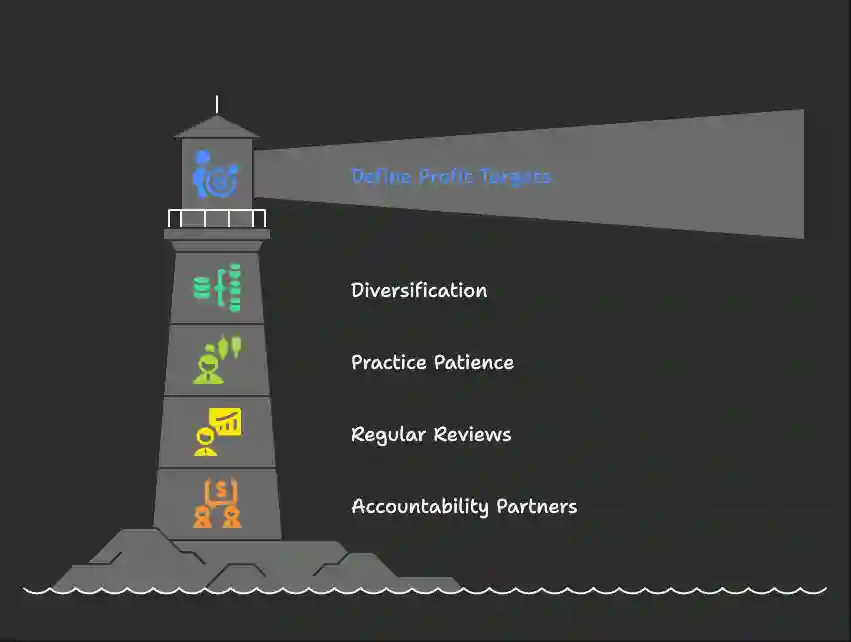The world of stock trading is often characterized not just by financial gains and losses, but by the intricate psychological dance of human emotions. Fear and greed are the twin forces that sway investor sentiment, impacting decisions and ultimately, investment outcomes. Whether you are a novice stepping into the Indian stock market or an experienced trader seeking to refine your approach, understanding how to manage these emotions can significantly enhance your trading performance. This article delves into the psychological aspects of trading, provides effective strategies for overcoming fear and greed, and highlights real-life success stories that underscore the importance of emotional resilience.
Understanding the Psychology of Trading
At the heart of any trader’s journey is the psychology of stock trading. Fear often manifests as anxiety over potential losses or market volatility, whereas greed arises from the desire for greater profits and the thrill of participating in uptrends. The psychological catalysts behind these emotions are not mere abstract concepts; they shape the way traders react to market movements.

The Role of Fear in Decision Making
Fear can lead to hasty decisions, such as selling off stocks during a market downturn rather than sticking to a well-considered plan. Traders frequently find themselves in a cycle of panic selling, which only heightens their stress and anxiety. In contrast, greed can propel traders to take unnecessary risks, leading to overexposure to volatile assets or buying stocks at inflated prices due to market hype.
Psychological research highlights that both fear and greed play crucial roles in market dynamics. For instance, according to a study by the National Bureau of Economic Research, these emotions deeply influence trading behavior, often resulting in a disconnect between rational analysis and emotional impulse.
Understanding how these emotions work can significantly improve your decision-making process. Fear of loss is often more potent than the desire for gains, leading many traders to exit positions prematurely. Conversely, the excitement of jumping into a “sure thing” can push traders toward impulsive decisions that deviate from their trading plans.
Strategies to Manage Fear in Trading
Recognizing Fear Triggers
The first step to overcoming fear in trading is acknowledging what triggers it. Common stimuli include market volatility—such as sudden drops in stock prices—and the fear of losing money on investments. For instance, during the COVID-19 market crash in March 2020, many investors panicked as stock prices plunged sharply. Those who succumbed to fear often sold their holdings in haste, missing out on the subsequent recovery that saw indices like the Nifty rebound significantly.
Traders can also experience fear when they encounter unfamiliar situations, such as trading a new stock, sector, or type of derivative. Recognizing that fear is a natural response can help traders accept it without allowing it to dictate their actions.
Coping Mechanisms for Fear
To keep fear at bay, traders can adopt several strategies:
- Set a Trading Plan: Establish clear entry and exit points for trades. By knowing in advance when you will buy or sell, you reduce the chance of making impulsive decisions fueled by fear.
- Utilize Stop-Loss Orders: Implementing stop-loss orders can safeguard against significant losses. This automated strategy ensures that stocks are sold once they reach a predetermined price, preventing emotional decision-making.
- Stay Informed: Regularly updating oneself with market trends and news can demystify unexpected changes, reducing anxiety. Knowledge empowers traders, making them less likely to succumb to fear. Check out our blog on How to Control Emotions in Trading for strategies on managing anxiety in the stock market.
- Practice Mindfulness Techniques: Techniques such as meditation, deep breathing, or yoga can help regulate stress levels and clear the mind. These practices can significantly aid traders in staying calm during turbulent market conditions.
- Limit Information Overload: In the digital age, information is readily available yet overwhelming. Traders should focus on credible sources and limit exposure to sensationalist news that may exacerbate fear.

Conquering Greed in Stock Trading
While fear prompts hasty decisions, greed tempts traders to overreach, often with disastrous consequences. Greed can emerge from the certainty of quick gains or being caught in market euphoria, leading to decisions driven by impulse rather than analysis.
The Dangers of Greed
Case in point: Adani stocks during their bullish phase in 2022 saw stock prices surge on the back of robust investments and market optimism. Many investors, driven by greed, purchased shares at peak prices, only to later face significant corrections when the market adjusted reality with valuations and negative news. The lesson here is that chasing after profits can cloud judgment, resulting in inflated positions that may jeopardize long-term investment success.
The lure of quick profits can easily steer even the most disciplined trader away from their strategies. Greed can create a sense of urgency that may lead to taking on more risk than is prudent, such as leveraging investments beyond one’s comfort level.
Maintaining Discipline in Trading
To combat greed, traders should focus on discipline:
- Define Profit Targets: Specify clear profit-taking levels based on market conditions and adhere to these, rather than chasing every upward tick.
- Diversification: By spreading investments across a variety of assets, traders can mitigate the risk of being overly focused on “winning big” from a single stock. This approach also allows for potential gains from different sectors, smoothing overall performance.
- Practice Patience: Recognize that not every market trend presents an opportunity. Resist the urge to act impulsively on every piece of news or market movement.
- Daily or Weekly Reviews: Conducting regular reviews of trading performance helps to bring awareness to one’s emotional state and decision-making patterns. Assess what emotional triggers led to specific trades and make adjustments as needed.
- Seek Accountability Partners: Sharing strategies and decisions with other traders can instill a sense of accountability and provide checks against unwise emotional trading decisions.

Balancing Emotion and Rationality in Trading
Finding a balance between emotional impulses and rational analysis is crucial for long-term trading success. Emotional intelligence forms the backbone of disciplined trading practices.
Importance of Emotional Intelligence
Being aware of one’s emotional state empowers traders to manage fear and greed effectively. Understanding personal triggers and responses allows traders to develop coping strategies tailored to their behavior.
- Journaling: Keeping a trading journal can help track both decisions made and the emotions experienced. This practice encourages reflection and mindfulness, helping traders identify patterns in their emotional responses.
- Cultivating Self-Awareness: Engage in self-reflection to assess how emotions influence decisions. Techniques such as mindfulness meditation can lead to greater awareness of the present moment and enhance emotional regulation.
Tools and Techniques for Balanced Trading
- Predefined Trading Rules: Stick to predefined criteria for entering and exiting trades, reducing the likelihood of emotional reactions affecting your decisions.
- Utilize Technology: Platforms that employ AI can help automate trading strategies, reducing the emotional stress of decision-making. Consider tools available at Stockastic, to project future returns and plan investments effectively.
- Mindfulness Techniques: Meditation and mindfulness can enhance focus and calmness, helping traders respond thoughtfully rather than reactively to market fluctuations.
- Structured Education: Participating in online courses and workshops designed to improve trading psychology will bolster your self-discipline and awareness. Learn from industry experts, adopt their strategies, and integrate them into your trading through practice.
Case Study of Successful Traders
Jhunjhunwala’s approach stresses patience and rational analysis, both vital for thriving in the tumultuous world of trading. He famously said, “The market is for everyone, but not everyone is for the market.” His disciplined strategies and emotional management techniques have contributed to his success, illustrating that even in times of market uncertainty, maintaining composure can lead to remarkable gains.
Another notable example is the investment approach of Ramesh Damani, who has capitalized on market opportunities by remaining resolute in his convictions. His strategy revolves around thorough analysis and patience, showing that emotional control can yield exceptional results.
Learn from the Experiences of Peers
Engage in discussions with fellow traders to share experiences related to overcoming emotions in the market. Understanding how others manage their emotional responses can provide valuable insight and foster growth in one’s own trading journey.
Conclusion: Embrace Balanced Trading Practices
Fear and greed are inevitable elements of trading. However, understanding their dynamics and implementing well-thought-out strategies can help traders navigate the emotional landscape of the stock market successfully. By sticking to rational trading principles, employing discipline, and harnessing emotional intelligence, traders can enhance their potential for success.
As you embark on or continue your trading journey, practice balanced and informed trading habits. Remember, the stock market is not just about profits; it’s also about making informed decisions devoid of emotional turmoil. Interested in more trading tips? Subscribe to the Stockastic blog for the latest insights and strategies tailored for Indian investors.
Additional Resources for Traders
- The Psychology of Trading by Brett Steenbarger
Fear and greed are fundamental emotional drivers that influence investor behavior in the stock market. Fear can lead to panic selling during downturns, while greed can result in impulsive buying in bullish markets. Understanding these emotions helps traders make more rational decisions and avoid common pitfalls.
To manage fear, traders can implement strategies such as creating a solid trading plan with predefined entry and exit points, utilizing stop-loss orders to limit losses, staying informed about market trends, and practicing mindfulness techniques like meditation. These approaches help reduce emotional reactions and enhance decision-making.
Traders can combat greed by defining clear profit targets and adhering to them, diversifying their portfolios to mitigate risk, practicing patience to avoid impulsive actions, and conducting regular self-reviews to understand emotional triggers. This disciplined approach helps maintain focus and rationality in trading.
A trading journal is vital as it provides insights into decision-making patterns and emotional responses to market fluctuations. By documenting trades and emotions, traders can reflect on their strategies, identify triggers for fear or greed, and make informed adjustments to enhance their trading discipline.

